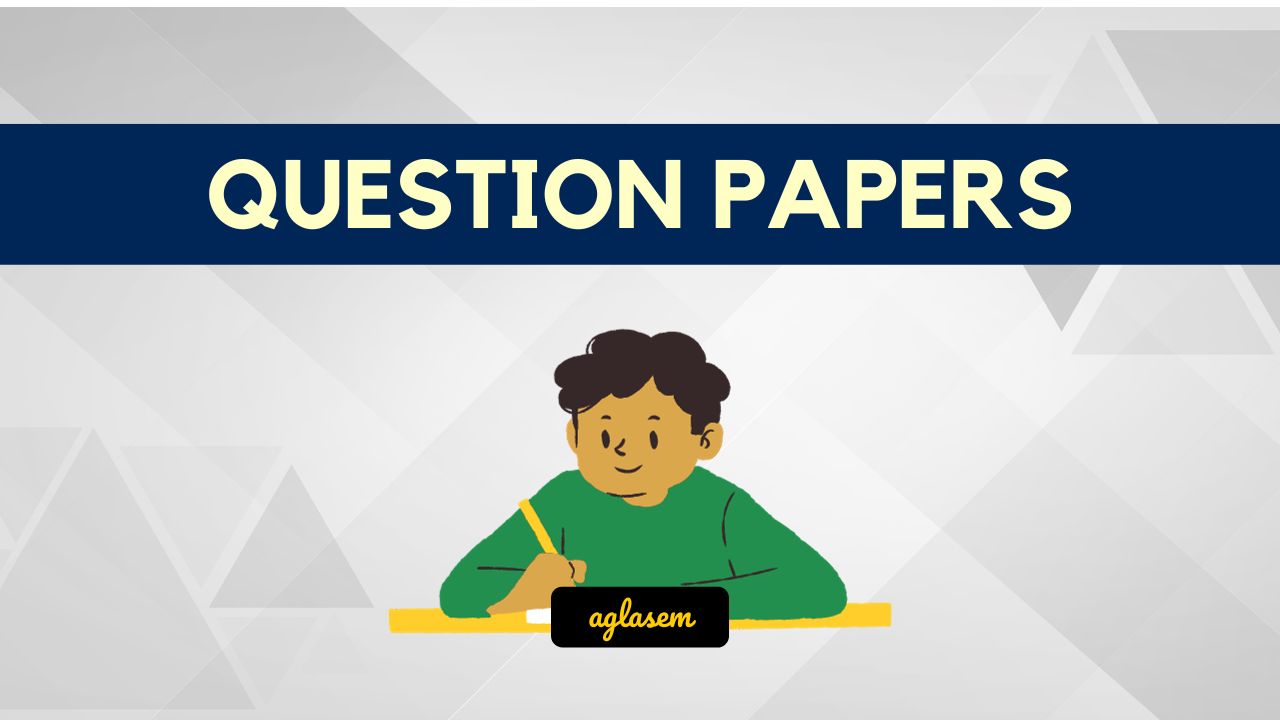Candidates can download NCERT Exemplar Class 9 Science Unit 8 from this page. The exemplar has been provided by the National Council of Educational Research & Training (NCERT) and the candidates can check it from below for free of cost. It contains objective, very short answer type, short answer type, and long answer type questions. Along with it, the answer for each question has also been provided. From the NCERT Exemplar Class 9 Science Unit 8, candidates can understand the level and type of questions that are asked in the exam.
NCERT Exemplar Class 9 Science Unit 8 Motion
NCERT Class 9 Science Unit 8 is for Motion. The type of questions that will be asked from NCERT Class 9 Science Unit 8 are displayed in the below provided NCERT Exemplar Class 9 Science Unit 8. With the help of it, candidates can prepare well for the examination.
Also Check NCERT Solutions for Class 9 Science
Multiple Choice Questions
- A particle is moving in a circular path of radius r. The displacement after half a circle would be:
(a) Zero
(b) p r
(c) 2 r
(d) 2p r - A body is thrown vertically upward with velocity u, the greatest height h to which it will rise is,
(a) u/g
(b) u2/2g
(c) u2/g
(d) u/2g - The numerical ratio of displacement to distance for a moving object is
(a) always less than 1
(b) always equal to 1
(c) always more than 1
(d) equal or less than 1 - If the displacement of an object is proportional to square of time, then the object moves with
(a) uniform velocity
(b) uniform acceleration
(c) increasing acceleration
(d) decreasing acceleration - From the given v – t graph (Fig. 8.1), it can be inferred that the object is
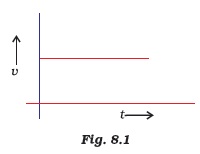
(a) in uniform motion
(b) at rest
(c) in non-uniform motion
(d) moving with uniform acceleration - Suppose a boy is enjoying a ride on a merry-go-round which is moving with a constant speed of 10 m s–1. It implies that the boy is
(a) at rest
(b) moving with no acceleration
(c) in accelerated motion
(d) moving with uniform velocity - Area under a v – t graph represents a physical quantity which has the unit
(a) m2
(b) m
(c) m3
(d) m s-1 - Four cars A, B, C and D are moving on a levelled road. Their distance versus time graphs are shown in Fig. 8.2. Choose the correct statement

(a) Car A is faster than car D.
(b) Car B is the slowest.
(c) Car D is faster than car C.
(d) Car C is the slowest - Which of the following figures (Fig. 8.3) represents uniform motion of a moving object correctly?
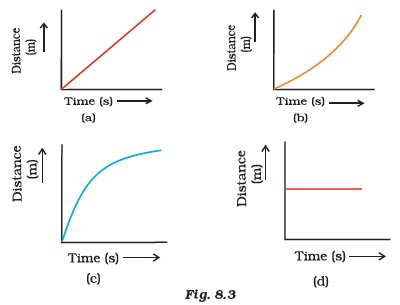
- Slope of a velocity – time graph gives
(a) the distance
(b) the displacement
(c) the acceleration
(d) the speed - In which of the following cases of motions, the distance moved and the magnitude of displacement are equal?
(a) If the car is moving on straight road
(b) If the car is moving in circular path
(c) The pendulum is moving to and fro
(d) The earth is revolving around the Sun
Short Answer Type Questions
- The displacement of a moving object in a given interval of time is zero. Would the distance travelled by the object also be zero? Justify you answer.
- How will the equations of motion for an object moving with a uniform velocity change?
- A girl walks along a straight path to drop a letter in the letterbox and comes back to her initial position. Her displacement–time graph is shown in Fig.8.4. Plot a velocity–time graph for the same.
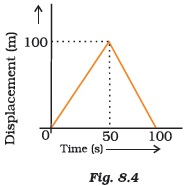
- A car starts from rest and moves along the x-axis with constant acceleration 5 m s–2 for 8 seconds. If it then continues with constant velocity, what distance will the car cover in 12 seconds since it started from the rest?
- A motorcyclist drives from A to B with a uniform speed of 30 km h–1 and returns back with a speed of 20 km h–1. Find its average speed.
- The velocity-time graph (Fig. 8.5) shows the motion of a cyclist. Find (i) its acceleration (ii) its velocity and (iii) the distance covered by the cyclist in 15 seconds.
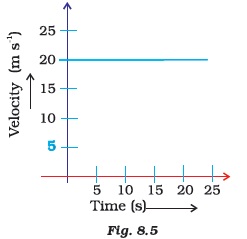
- Draw a velocity versus time graph of a stone thrown vertically upwards and then coming downwards after attaining the maximum height.
Long Answer Type Questions
- An object is dropped from rest at a height of 150 m and simultaneously another object is dropped from rest at a height 100 m. What is the difference in their heights after 2 s if both the objects drop with same accelerations? How does the difference in heights vary with time?
- An object starting from rest travels 20 m in first 2 s and 160 m in next 4 s. What will be the velocity after 7 s from the start.
- Using following data, draw time – displacement graph for a moving object:

Use this graph to find average velocity for first 4 s, for next 4 s and for last 6 s. - An electron moving with a velocity of 5 × 104 m s-1 enters into a uniform electric field and acquires a uniform acceleration of 104 m s-2 in the direction of its initial motion.
(i) Calculate the time in which the electron would acquire a velocity double of its initial velocity.
(ii) How much distance the electron would cover in this time? - Obtain a relation for the distance travelled by an object moving with a uniform acceleration in the interval between 4th and 5th seconds.
- Two stones are thrown vertically upwards simultaneously with their initial velocities u1 and u2 respectively. Prove that the heights reached by them would be in the ratio of u21 : u22 ( Assume upward acceleration is –g and downward acceleration to be +g ).
| « Previous | Next » |
Answers
To get study material, exam alerts and news, join our Whatsapp Channel.







